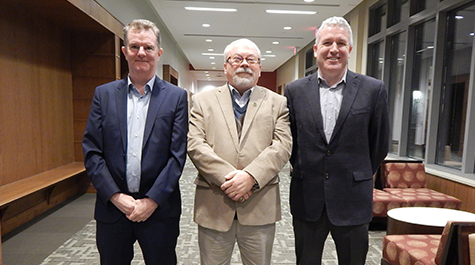School of Education hosts talk on Irish education
 In Ireland, 93% of primary schools are still under church control. Standardized testing in primary and secondary schools was mandated less than five years ago. Teacher-education programs are in high demand, attracting the very best students graduating from secondary school. And while 10% of the national education budget is allocated to students with special needs, none is provided for gifted education.
In Ireland, 93% of primary schools are still under church control. Standardized testing in primary and secondary schools was mandated less than five years ago. Teacher-education programs are in high demand, attracting the very best students graduating from secondary school. And while 10% of the national education budget is allocated to students with special needs, none is provided for gifted education.
These are just a few aspects of the country’s education system that William & Mary School of Education students learned from two prominent Irish educators who spoke at the school on Nov. 17.
Funded by William & Mary’s Center for Gifted Education, with support from the Reves Center for International Studies, the talk brought Joe O’Hara, Inaugural Professor of Education at the Dublin City University Institute of Education, and Colm O’Reilly, Director of the Centre for Talented Youth, Ireland, to campus for a discussion about Irish education.
If you are going to change the education system, you have to change the teacher
With 25 years of experience in teacher education, Joe O’Hara was well-positioned to tackle a thorny challenge: helping to bring together the faculty of four diverse institutions under the umbrella of Dublin City University (DCU) to form Ireland’s only Faculty of Education.
The consolidation was the result of major changes in Irish educational policy since the 2008 economic collapse, which became a decisive turning point for education in Ireland. Teacher salaries were cut by up to 25% and a hiring freeze meant many new teachers had no choice but to emigrate. Ireland’s rating by PISA, the international body that assesses student performance, took a steep drop. Nationally, it was argued by some that the state of education was in crisis.
In response, Ireland sought not only to consolidate teaching programs and emphasize the importance of formal linkages with universities, but also “reconceptualized” the role of teachers and how teachers are educated.
Requirements for teacher preparation programs increased significantly, with more time required for the degree and in school placement experiences. A greater emphasis on research means that every teacher must be trained in rigorous research methods. O’Hara spoke of the “constant push to do more” and the challenges of a rapidly changing system.
International collaborations are fueling Irish innovations in gifted education
Despite a lack of national funding for gifted education, dedicated educators like Colm O’Reilly are doing important work to reach this population, fueled by international collaboration and knowledge-sharing.
In the early 1990’s, a partnership between Johns Hopkins University and DCU led to the establishment of the Center for Talented Youth Ireland (CTYI). The program began offering university-style summer courses for high-ability secondary school students in 1992.
In recent years, CTYI has worked closely with William & Mary’s Center for Gifted Education in its mission to identify and assess students of exceptional ability, support parents and teachers, and perform research in the field of gifted education. CTYI now offers a wide range of programs for students aged 6-16.
O’Reilly, the director of the program, spoke of CTYI’s future as one driven by partnerships—student and staff exchanges, joint online programs and research collaborations.
O’Reilly and Tracy Cross, the evening’s host and executive director of W&M’s Center for Gifted Education, invited students and faculty to join them in their work to expand the impact of gifted education programs in the U.S, Ireland and across the globe.
See a full listing of upcoming talks at the William & Mary School of Education.